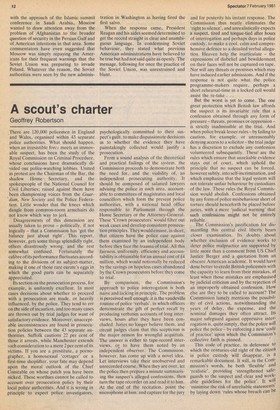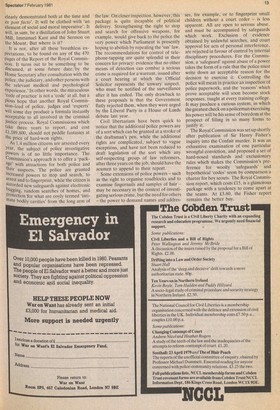A scout's charter
Geoffrey Robertson
,There are 120,000 policemen in England and Wales, organised within 43 separate police authorities. What should happen, when an irresistible force meets an immovable suspect, has been the study of the Royal Commission on Criminal Procedure, whose conclusions have dramatically divided our police-watching lobbies. United in protest are the Chairman of the Bar, the shadow Home Secretary, and the spokespeople of the National Council for Civil Liberties; raised against them have been championing voices from the Guar' clian, New Society and the Police Federation. Little wonder that the knees which dangle from common-room armchairs do not know which way to jerk.
Disagreements of this dimension are usually taken to prove — politically, if not logically — that a Commission has 'got the balance just about right'. This report, however, gets some things splendidly right, others disastrously wrong, and the rest somewhat confused. Fortunately the calibre of its performance fluctuates according to the divisions of its subject-matter, making it one of those rare curate's eggs in which the good parts can be separately appreciated.
Its section on the prosecution process, for example, is uniformly excellent. In most cases decisions about whether to proceed with a prosecution are made, or heavily influenced, by the police. They tend to err on the side of incaution, and too many cases are thrown out by trial judges for want of satisfactory evidence. Moreover, unacceptable inconsistencies are found in prosecution policies between the 43 separate authorities. Suffolk cautions 22 per cent of those it arrests, while Manchester extends such consideration to a mere 2 per cent of its victims. If you are a prostitute, a pornographer, a homosexual 'cottager' or a first-time shoplifter, your fate may depend upon the moral outlook of the Chief Constable on whose patch you have been nicked. These worthies cannot be called to account over prosecution policy by their local police authorities. And it is wrong in principle to expect police investigators, psychologically committed to their suspect's guilt, to make dispassionate decisions as to whether the evidence they have painstakingly collected would justify a 'prosecution.
From a sound analysis of the theoretical and practical -failings of the system, the Commission proceeds to demonstrate both the need for, and the viability of, an independent prosecuting authority: It should be composed of salaried lawyers advising the police in each area, accountable to committees of magistrates and local councillors which form the present police authorities, with a national head office responsible to Parliament through the Home Secretary or the Attorney-General. These 'Crown prosecutors' would filter out weak cases and develop consistent prosecution principles. Theywould ensure, in short, that citizens have the police case against them examined by an independent body before they face the trauma of trial. All this fairness, uniformity, efficiency and accountability is obtainable for an annual cost of £4 million, which would notionally be reduced by the savings on hopeless cases abandoned by the Crown prosecutors before they come to trial.
By comparison, the Commission's approach to police interrogation is both naive and lacking in principle. The problem is perceived well enough: it is the vaudeville routine of police `verhals'. in which officers demonstrate the gift of perfect recall by producing verbatim accounts of long interviews, hours after they have been concluded. Juries no longer believe them, and circuit judges claim that this scepticism is the major reason for wrongful acquittals. The answer is either to tape-record interviews, or. to have them noted by an independent observer. The Commission, however, has come up with a novel idea. Let interviews take their unobserved and unrecorded course. When they are over, let the police then prepare a minute summarising the suspect's alleged confessions, then turn the tape recorder on and read it to him, At the end of the recitation, point the microphone at him, and capture for the jury and for posterity his instant response. The Commission thus neatly eliminates the 'right to silence', and unrealistically expects a suspect, tired and tongue-tied after hours of interrogation and perhaps days in police custody, to make a cool, calm and comprehensive defence to a detailed verbal allegation. Heaven help the inarticulate — the expressions of disbelief and bewilderment . on their faces will not be captured on tape. Nor will any threats or promises which may have induced earlier admissions. And if the response is not quite ,what the police programme-makers require, perhaps a short rehearsal-time in a locked cell would assist the re-take . .
But the worst is yet to come. The one great protection which British law affords the suspect is its invariable rule that a confession obtained through any form of pressure — threats, promises or oppression — is strictly inadmissible at the trial, And when police break lesser rules— by failing to caution, for example, or unreasonably denying access to a solicitor— the trial judge has a discretion to exclude any confession volunteered subsequently. These' are the rules which ensure that unreliable evidence stays out of court, which uphold the , principle that no suspect can be forced, however subtly, into self-incrimination, and which emphasise that the legal system will not tolerate unfair behaviour by custodians of the law. These rules the Royal Commission would abolish. Confessions obtained Ity any form of police misbehaviour short of torture should henceforth be placed before juries, with a mere 'judicial warning' that such confessions might not be entirely reliable.
The Commission's justification for dismantling this central civil liberty bears closer examination. Its doubts about whether exclusion of evidence works to deter police malpractice are supported by little more than a comment from US Chief Justice Berger and a quotation from an obscure American academic. It would have done better to credit British policemen with the capacity to learn from their mistakes, at least when those mistakes are emphasised by judicial criticism and by the rejection of an improperly obtained confession. How else are they to be called to account? The Commission lamely mentions the possibility of civil actions, notwithstanding the years of delay, the expense, and the nominal damages they often attract. Its major safeguard against oppressive interrogation is, quite simply, that the police will police the police — by enforcing a new 'code of practice' upon which the Commission's collective faith is pinned. This code of practice, in deference to which the centuries-old right of the citizen in police custody will disappear, is a remarkable document. It will, in the Commission's words, be both 'flexible' and 'realistic'. providing 'strengthened safeguards to the suspect and clear and workable guidelines for the police'. It will 'minimise the risk of unreliable statements by laying down 'rules whose breach can be clearly demonstrated both at the time and ex post facto'. It will be clothed with 'an element of social and moral imperative'. It will, in sum, be a distillation of John Stuart Mill, Immanuel Kant and the Sermon on the Mount. But where is it?
It is not, after all these breathless expectations, to be found on any of the 470 Pages of the Report of the Royal Commission. It turns out to be something to be discussed, at some future date,'by the Home Secretary after consultation with the Police, the judiciary, and other persons with the relevant medical and psychological experience.' In other words, the miraculous 'code of practice' is not a 'code' at all, but a Pious hope that another Royal Commission—load of police, judges and 'experts' will some day produce a formula instantly acceptable to all involved in the criminal justice process, Royal Commissions which take three years to report, and cost £1,189,800, should not peddle fantasies at the price of hard-won rights. As 1.4 million citizens are arrested every Year, the subject of police investigative Powers is of no little importance. The Commission's approach is to offer a 'package with attractions for both police and their suspects. The police are granted increased powers to stop and search, to arrest and to fingerprint, while the citizen is accorded new safeguards against electronic bugging, random searches of homes, and protection for what are coyly termed 'intimate bodily cavities' from the long arm of the law. On closer inspection, however, this package is quite incapable of political delivery. Strengthening the right to stop . and search for offensive weapons, for example, would give back to the police the very power which Parliament is presently hoping to abolish by repealing the 'sus' law. The recommendations for control of telephone-tapping are quite splendid in their concern for privacy: evidence that no other. means of detection can combat a serious crime is required for a warrant, issued after :a court hearing at which the Official Solicitor represents the unwary suspect, who must be notified of the surveillance after it has ended. The only drawback to these proposals is that the Government flatly rejected them, when they were urged by the Liberal Party in a House of Lords debate last year..
Civil libertarians have been quick to 'notice that the additional police powers are of a sort which can be granted at a stroke of \ the draftsman's pen, while the additional rights are complicated, subject to vague exceptions, and have not been reduced to draft legislation of the sort which any self-respecting group, of law reformers, after three years on the job, should have the acumen to append to their report.
Some extensions of police powers — such as the right to organise roadblocks and to examine fingernails and samples of hair — may be necessary in the context of investigating serious crime, but the need for others — the power to demand names and addres ses, for example, or to fingerprint small children without a court order — is less apparent. All are open to serious abuse, and must be accompanied by safeguards which work. Exclusion of evidence obtained by unlawful searches, and court approval for acts of personal interference, are rejected in favour of control by internal disciplinary procedures. For the Commission, a 'safeguard' against abuse of a power takes the form of a rule that the police must write down an acceptable reason for the decision to exercise it. Controlling the police will mean in practice an inspection of police paperwork, and the 'reasons' which prove acceptable will soon become stock responses, taught at every training college. It may produce a curious system, in which the greatest check on a policeman exercising his power will be his sense of boredom at the prospect of filling in so many forms to justify it.
The Royal Commission was set up shortly after publication of Sir Henry Fisher's inquiry into the Confait murder. It was an exhaustive, examination of one particular wrongful conviction, and proposed a set of hard-nosed standards and exclusionary rules which makes the Commission's preference for woolly *safeguards' and hypothetical 'codes' seem by comparison a charter for boy scouts. The Royal Commission report, which costs £15. is a glamorous package with a tendency to come apart at the seams. At £3,60, the Fisher report remains the better buy.







































 Previous page
Previous page